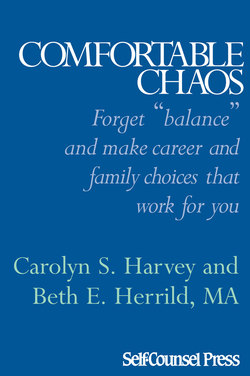Читать книгу Comfortable Chaos - Carolyn Harvey & Beth Herrild - Страница 27
На сайте Литреса книга снята с продажи.
Give up Perfectionism
ОглавлениеSuccumbing to the pressure of the corporate beast is what creates perfectionism and it’s not all it’s cracked up to be. Contrary to popular opinion, perfectionism is different than striving for excellence. In fact, true perfectionism is often the enemy of excellence.
Take the example of Teri, who is working on her bachelor’s degree. She is a pure perfectionist when it comes to her standards for herself and her grades. She takes the required classes for her major and maintains nearly a 4.0 grade point average and a place on the dean’s list every semester. When the opportunity arises to take a couple of advanced classes that are not required, she chooses not to take them for fear that she may not do as well in them and bring down her grade point average.
She is not alone in this tendency. Many perfectionists will shy away from risks and consequently do not grow and learn to become the best person they can be. Fear of achieving something less than perfection can inhibit and paralyze. It can also prevent you from having fun — a definite element of Comfortable Chaos! Many people won’t even try new sports or recreational activities that could enrich their lives because they are afraid that, at least initially, they won’t be very good at them. Their mantra is, “If I can’t do it well, I won’t even try.”
Perfectionism can also drive you crazy and cause you to end up feeling perpetually stressed and angry. You may actually perseverate on certain things while not allowing time to attend to other key priorities. The net effect prevents us from achieving excellence.
Do any of these scenarios sound familiar? You are working on a huge and high-visibility project at work. You stress and worry over it far beyond that point at which you could have said to yourself, “I did my best, I need to move on to other things now.” You continue working and reworking the numbers and your presentation. In the meantime you have missed deadlines and dropped the ball on several less important projects. The result is that the coworkers involved in the other projects begin to view you as a person who is not always on top of everything and not always reliable. In the end, the high-visibility project is received moderately well, but all the extended work did not pay off. Was it really worth damaging your relationships for the sake of an only marginally improved presentation?
This same phenomenon can occur in family and parenting choices. Let’s say your daughter’s class is having a party at school. You’ve been asked to bring in some treats on Friday. You know that Thursday is going to be a busy evening, but instead of giving a little on your standard of being the “perfect cookie Mom” and purchasing a treat, you stay up way too late baking these incredibly complex, cute little cookies. The next day, your daughter takes them to school and you never hear a word of thanks or praise from the teacher or any of the other parents involved. You fulfilled your self-perpetuated “perfect cookie Mom” image but got very little gratification. Instead, you are tired and cranky the entire next day, which prevents you from being as efficient as you would like at work and causes you to snap at your children. Is this really excellence?
Remember that perfectionism is not a badge of honor — it only feeds the corporate beast. Let go of the perfectionist approach and you will take back a good chunk of your life.
